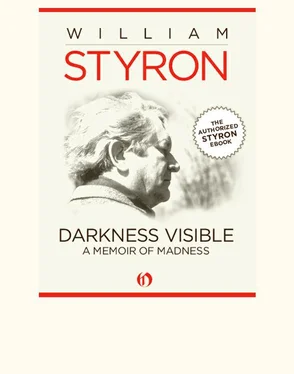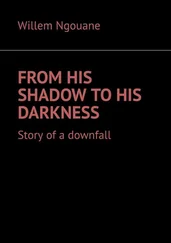William Styron - Darkness Visible
Здесь есть возможность читать онлайн «William Styron - Darkness Visible» весь текст электронной книги совершенно бесплатно (целиком полную версию без сокращений). В некоторых случаях можно слушать аудио, скачать через торрент в формате fb2 и присутствует краткое содержание. Город: New York, Год выпуска: 2010, ISBN: 2010, Издательство: Open Road Integrated Media, Жанр: Биографии и Мемуары, Психология, на английском языке. Описание произведения, (предисловие) а так же отзывы посетителей доступны на портале библиотеки ЛибКат.
- Название:Darkness Visible
- Автор:
- Издательство:Open Road Integrated Media
- Жанр:
- Год:2010
- Город:New York
- ISBN:978-1-936317-29-5
- Рейтинг книги:5 / 5. Голосов: 1
-
Избранное:Добавить в избранное
- Отзывы:
-
Ваша оценка:
- 100
- 1
- 2
- 3
- 4
- 5
Darkness Visible: краткое содержание, описание и аннотация
Предлагаем к чтению аннотацию, описание, краткое содержание или предисловие (зависит от того, что написал сам автор книги «Darkness Visible»). Если вы не нашли необходимую информацию о книге — напишите в комментариях, мы постараемся отыскать её.
Darkness Visible — читать онлайн бесплатно полную книгу (весь текст) целиком
Ниже представлен текст книги, разбитый по страницам. Система сохранения места последней прочитанной страницы, позволяет с удобством читать онлайн бесплатно книгу «Darkness Visible», без необходимости каждый раз заново искать на чём Вы остановились. Поставьте закладку, и сможете в любой момент перейти на страницу, на которой закончили чтение.
Интервал:
Закладка:
William Styron
DARKNESS VISIBLE
A Memoir of Madness
To Rose
For the thing which
I greatly feared is come upon me,
and that which I was afraid of
Is come unto me.
I was not in safety, neither
had I rest, neither was I quiet;
yet trouble came.
—JobAUTHOR’S NOTE
This book began as a lecture given in Baltimore in May 1989 at a symposium on affective disorders sponsored by the Department of Psychiatry of The Johns Hopkins University School of Medicine. Greatly expanded, the text became an essay published in December of that year in Vanity Fair. I had originally intended to begin with a narrative of a trip I made to Paris—a trip which had special significance for me in terms of the development of the depressive illness from which I had suffered. But despite the exceptionally ample amount of space I was given by the magazine, there was an inevitable limit, and I had to discard this part in favor of other matters I wanted to deal with. In the present version, that section has been restored to its place at the beginning. Except for a few relatively minor changes and additions, the rest of the text remains as it originally appeared.
—W. S.
I
IN PARIS ON A CHILLY EVENING LATE IN OCTOBER OF 1985 I first became fully aware that the struggle with the disorder in my mind—a struggle which had engaged me for several months—might have a fatal outcome. The moment of revelation came as the car in which I was riding moved down a rain-slick street not far from the Champs-Élysées and slid past a dully glowing neon sign that read HÔTEL WASHINGTON. I had not seen that hotel in nearly thirty-five years, since the spring of 1952, when for several nights it had become my initial Parisian roosting place. In the first few months of my Wanderjahr, I had come down to Paris by train from Copenhagen, and landed at the Hôtel Washington through the whimsical determination of a New York travel agent. In those days the hotel was one of the many damp, plain hostelries made for tourists, chiefly American, of very modest means who, if they were like me—colliding nervously for the first time with the French and their droll kinks—would always remember how the exotic bidet, positioned solidly in the drab bedroom, along with the toilet far down the ill-lit hallway, virtually defined the chasm between Gallic and Anglo-Saxon cultures. But I stayed at the Washington for only a short time. Within days I had been urged out of the place by some newly found young American friends who got me installed in an even seedier but more colorful hotel in Montparnasse, hard by Le Dôme and other suitably literary hangouts. (In my mid-twenties, I had just published a first novel and was a celebrity, though one of very low rank since few of the Americans in Paris had heard of my book, let alone read it.) And over the years the Hôtel Washington gradually disappeared from my consciousness.
It reappeared, however, that October night when I passed the gray stone façade in a drizzle, and the recollection of my arrival so many years before started flooding back, causing me to feel that I had come fatally full circle. I recall saying to myself that when I left Paris for New York the next morning it would be a matter of forever. I was shaken by the certainty with which I accepted the idea that I would never see France again, just as I would never recapture a lucidity that was slipping away from me with terrifying speed.
Only days before I had concluded that I was suffering from a serious depressive illness, and was floundering helplessly in my efforts to deal with it. I wasn’t cheered by the festive occasion that had brought me to France. Of the many dreadful manifestations of the disease, both physical and psychological, a sense of self-hatred—or, put less categorically, a failure of self-esteem—is one of the most universally experienced symptoms, and I had suffered more and more from a general feeling of worthlessness as the malady had progressed. My dank joylessness was therefore all the more ironic because I had flown on a rushed four-day trip to Paris in order to accept an award which should have sparklingly restored my ego. Earlier that summer I received word that I had been chosen to receive the Prix Mondial Cino del Duca, given annually to an artist or scientist whose work reflects themes or principles of a certain “humanism.” The prize was established in memory of Cino del Duca, an immigrant from Italy who amassed a fortune just before and after World War II by printing and distributing cheap magazines, principally comic books, though later branching out into publications of quality; he became proprietor of the newspaper Paris-Jour. He also produced movies and was a prominent racehorse owner, enjoying the pleasure of having many winners in France and abroad. Aiming for nobler cultural satisfactions, he evolved into a renowned philanthropist and along the way established a book-publishing firm that began to produce works of literary merit (by chance, my first novel, Lie Down in Darkness, was one of del Duca’s offerings, in a translation entitled Un Lit de Ténèbres); by the time of his death in 1967 this house, Éditions Mondiales, became an important entity of a multifold empire that was rich yet prestigious enough for there to be scant memory of its comic-book origins when del Duca’s widow, Simone, created a foundation whose chief function was the annual bestowal of the eponymous award.
The Prix Mondial Cino del Duca has become greatly respected in France—a nation pleasantly besotted with cultural prizegiving—not only for its eclecticism and the distinction shown in the choice of its recipients but for the openhandedness of the prize itself, which that year amounted to approximately $25,000. Among the winners during the past twenty years have been Konrad Lorenz, Alejo Carpentier, Jean Anouilh, Ignazio Silone, Andrei Sakharov, Jorge Luis Borges and one American, Lewis Mumford. (No women as yet, feminists take note.) As an American, I found it especially hard not to feel honored by inclusion in their company. While the giving and receiving of prizes usually induce from all sources an unhealthy uprising of false modesty, backbiting, self-torture and envy, my own view is that certain awards, though not necessary, can be very nice to receive. The Prix del Duca was to me so straightforwardly nice that any extensive self-examination seemed silly, and so I accepted gratefully, writing in reply that I would honor the reasonable requirement that I be present for the ceremony. At that time I looked forward to a leisurely trip, not a hasty turnaround. Had I been able to foresee my state of mind as the date of the award approached, I would not have accepted at all.
Depression is a disorder of mood, so mysteriously painful and elusive in the way it becomes known to the self—to the mediating intellect—as to verge close to being beyond description. It thus remains nearly incomprehensible to those who have not experienced it in its extreme mode, although the gloom, “the blues” which people go through occasionally and associate with the general hassle of everyday existence are of such prevalence that they do give many individuals a hint of the illness in its catastrophic form. But at the time of which I write I had descended far past those familiar, manageable doldrums. In Paris, I am able to see now, I was at a critical stage in the development of the disease, situated at an ominous way station between its unfocused stirrings earlier that summer and the near-violent denouement of December, which sent me into the hospital. I will later attempt to describe the evolution of this malady, from its earliest origins to my eventual hospitalization and recovery, but the Paris trip has retained a notable meaning for me.
Читать дальшеИнтервал:
Закладка:
Похожие книги на «Darkness Visible»
Представляем Вашему вниманию похожие книги на «Darkness Visible» списком для выбора. Мы отобрали схожую по названию и смыслу литературу в надежде предоставить читателям больше вариантов отыскать новые, интересные, ещё непрочитанные произведения.
Обсуждение, отзывы о книге «Darkness Visible» и просто собственные мнения читателей. Оставьте ваши комментарии, напишите, что Вы думаете о произведении, его смысле или главных героях. Укажите что конкретно понравилось, а что нет, и почему Вы так считаете.












